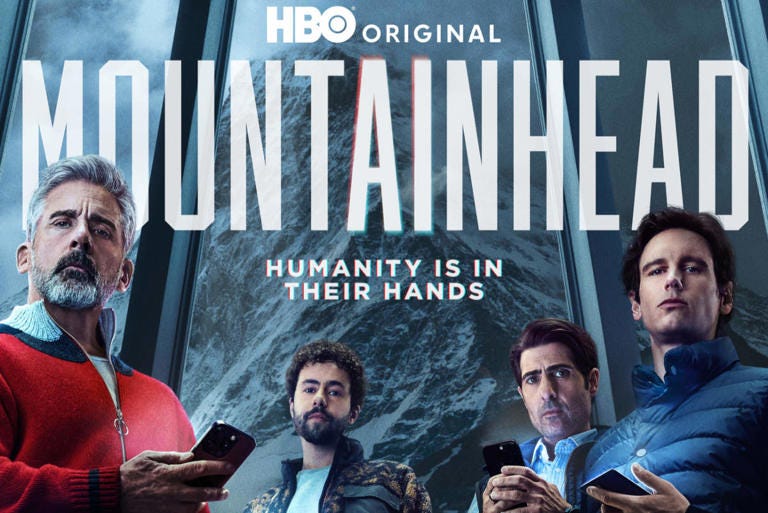Mountainhead - When The Gods of Code Play With Loaded Dice

I remember the distinct hum of a 2400 baud modem connecting, that screechy symphony heralding entry into the nascent digital world of Bulletin Board Systems. Back then, running Radio Ga Ga BBS from my parents' second phone line, the internet felt like a sprawling, untamed frontier, brimming with a kind of raw, almost naive potential. We were digital pioneers, convinced we were building a better, more connected future, one pixelated graphic at a time. My first Geocities page, a glorious mess of spinning GIFs and MIDI music, was a testament to that unbridled, if aesthetically challenged, optimism.
Fast forward a few decades, and HBO’s "Mountainhead" lands with the subtlety of a server crash during a product launch. Jesse Armstrong, fresh off dissecting the dynastic rot of the Murdochs in "Succession," now turns his satirical scalpel to the tech titans, those self-appointed digital Gandalfs shaping our reality from their alpine retreats. The film gathers a quartet of these "digital oligarchs" for a poker weekend while a global crisis, conveniently sparked by one of their platforms, rages outside their floor-to-ceiling windows. It’s a premise so timely it almost feels like a documentary shot through a particularly cynical lens.
Now, I’ve spent a good chunk of my life in and around the tech world. From my early coding days, through seven years helping build Google in Israel, to launching ventures like HUMANS and the AI-driven Languizy, I’ve seen the utopian sales pitches firsthand. I even wrote a book, "Keep Your Day Job," about navigating the AI upheaval. So, when "Mountainhead" presents its characters – Randall, the "Papa Bear" VC with a god complex refusing his own mortality; Jeff, the AI ethics peddler whose net worth inflates with global chaos; Venis, the social media mogul eager to jettison humanity for transhumanism while his platform burns the world – I see reflections, albeit grotesque ones, of certain archetypes.
The film wants to be a "frightfully credible comedy about the delusions of tech utopianism." And it is, in flashes. The dialogue has that Armstrong zing, that particular flavor of privileged people saying awful things with unnerving conviction. But here’s where my own internal debugger starts flashing red. Is "Mountainhead" truly shocking us with new revelations? The idea that immense power, particularly the kind wielded from Silicon Valley (or its fictional equivalent), corrupts and detaches its wielders from mere mortals isn't exactly breaking news. It’s a truth so well-worn it’s practically a default setting in our cultural consciousness. The film polishes this truth with undeniable skill, but is it a deep cut or just a very expensive echo chamber?
There's a delicious, if slightly uncomfortable, irony in HBO, a media titan in its own right, producing this critique of insulated elites. It’s like one mountain peak judging another for its altitude. The view is spectacular, the air is thin, but the ground-level realities feel very far away. The characters, like Venis, described as "stunted in adolescence," are so repellent, so comprehensively awful, that they risk becoming caricatures. If these architects of our digital future are just emotionally constipated man-children, does it let us, the audience, off too easily? We can point and say, "Well, I'm not like that," sidestepping the more unsettling questions about how such figures gain their power, or how their grand, destructive ambitions might be magnified versions of more mundane, everyday desires for control or recognition.
The ghost of Ayn Rand looms large, with the retreat itself reportedly named "The Fountainhead" in some materials. The film critiques a perverted individualism, where ego, untethered from any ethical mooring, becomes a destructive force. These tech bros see themselves as Howard Roark, reshaping the world through sheer will. But are they truly engaging with any philosophy, or just grabbing intellectual-sounding justifications for their impulses, like a kid collecting shiny rocks? My MA in Digital Philosophy taught me that ethical frameworks are complex; in "Mountainhead," they often feel like convenient afterthoughts to justify the unjustifiable, like debating murder on "utilitarian grounds" to get a "killer app."
And then there's the AI, the deep-fake driven chaos. The film is undeniably timely here. But is AI the true villain, or is it just the latest, shiniest weapon in the arsenal of age-old human failings? Greed, ego, tribalism – these aren't new bugs in the human operating system. AI just gives them an upgrade with a terrifyingly efficient new set of APIs. The film focuses on the "newness" of the AI threat, but I wonder if the more cynical, and perhaps more accurate, message is that our capacity for folly is simply being amplified, not reinvented.
"Mountainhead" is a sharp piece of work, no doubt. It’s a conversation starter, a mirror reflecting some of the more grotesque faces of our time. But as someone who once believed in the utopian promise of a spinning blue genie on a Geocities page, I can't help but feel a certain weariness. The film confirms our worst fears about the gods of code playing with loaded dice. What it doesn't quite do is show us how to get a seat at their table, or better yet, how to build a different game entirely. Perhaps that's too much to ask of a satire. Or perhaps, that's the work left for us, after the credits roll and the uncomfortable laughter fades.
